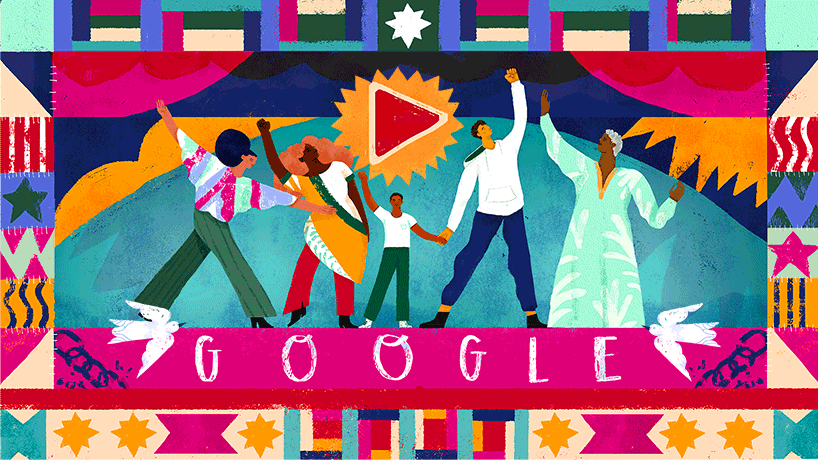Today's Google Doodle is the 155th Anniversary of Juneteenth.

In 1863, Abraham Lincoln’s Emancipation Proclamation freed slaves in the United States. For many Americans, this simple statement has been taught to us in grade school for decades. As a young Black girl growing up in Memphis, I remember my teachers teaching this, too. What I was not taught, however, was the FULL story of American slavery and its slow and painful end, even after Lincoln’s Proclamation. At its best, this limited narrative reduces the struggle for Black liberation in America to a singular moment. And at its worst, it perpetuates an incomplete truth that robs every American of understanding what actually happened after slavery was reformed.
Today’s video Doodle, illustrated by Los Angeles-based guest artist Loveis Wise and narrated by actor and activist LeVar Burton, honors the 155th anniversary of Juneteenth. Short for “June Nineteenth,” Juneteenth marks the true end of chattel slavery across the United States— which didn’t actually occur until 1865, two and a half years after the Emancipation Proclamation. Specifically, it marks the day when enslaved Black people in Galveston, Texas (one of the westernmost points in the Confederate South) finally received news of their liberation by Union Major General Gordon Granger. He arrived with 1,800 federal troops in order to ensure compliance in Confederate states, many of which continued to defy the executive order years after it was mandated.
I can’t begin to imagine what it must have felt like to wait in anticipation for freedom and then finally hear the words spoken aloud. After recieving the news, the first acts of freedom included locating family members who were sold and shipped off during slavery, legally changing their own names, and creating schools and places to learn, which slaves had been systematically denied before. Couples obtained marriage certificates to form legal union with the person they loved. And later, they built towns like Freedmen's Town in Houston, TX, established universities like Tuskegee in Alabama, and created a Black Wall Street in Tulsa, Oklahoma.
Though widely celebrated by the community in its first years, Juneteenth’s absence in the mainstream U.S. historical narrative has made it an unknown holiday to many for decades. The 1960s Civil Rights Era saw a resurgence in Juneteenth awareness, leading to the creation of today’s two largest Juneteenth celebrations in Milwaukee and Minneapolis. Later in 1979, U.S. Representative Al Edwards introduced legislation in Texas to officially recognize the holiday, making it a state holiday the following year.
Over time, this growing awareness of Juneteenth has led to an exponential growth of events in cities across the nation. These celebrations have included rodeos featuring black cowboys, parades with gorgeous floats, readings of the Proclamation, songs like “Lift Every Voice and Sing,” and much more.
I didn’t grow up celebrating Juneteenth. It wasn’t until I attended Hampton University, a historically Black university in Virginia (and home of Emancipation Oak, the site of the first Southern reading of the Emancipation Proclamation), that I learned about the holiday. I was shocked that schools back home hadn’t taught us about the day and that my family was completely unaware of it.
But my initial disappointment has shifted to optimism as I’ve witnessed a resurgence of this day in the American consciousness. For example, in the past week, Google Search interest in "Juneteenth meaning" spiked +850%, with the most searched query being “What is Juneteenth?” To me, history is a living, breathing, and changing testimony. And now that history can be accessed and shaped in ways generations before would’ve never thought possible.
Today, I hope folks across the nation commemorate Juneteenth by remembering and sharing the stories of those who lived in slavery before us and those who died for our freedom. I hope they celebrate it by creating space for expressions of Black joy and triumph, as well as teaching that June 19, 1865 was just the beginning. I hope they celebrate it by watching today’s Doodle, which aims to reflect how freedom in America is a journey. Even with executive orders, amendments, civil rights bills, and advancements in technology, the struggle to be treated fair and equal continues. And yet, despite all this, Black Americans still remain hopeful. I hope that people can relate to the basic human desire for liberty, equality, and access to opportunities to create a better life for our families and generations that follow.
Juneteenth is an American story about persistence, freedom, and joy no matter the obstacle. May this year's celebration provide an opportunity to honor the progress that's been made and reflect on the important changes that still remain ahead.
“...Now let us march on ‘til victory is won.”
—Angelica McKinley
Project Creative Director, 155th Anniversary of Juneteenth Google Doodle